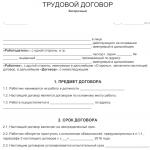Commentary on Article 301 of the Civil Code of the Russian Federation
based on judicial practice
Resolution of the Plenum of the Supreme Court of the Russian Federation No. 10, Plenum of the Supreme Arbitration Court of the Russian Federation No. 22 of 04/29/2010
"On some issues arising in judicial practice when resolving disputes related to the protection of property rights and other property rights"
Disputes about reclaiming property from someone else's
illegal possession
32. When applying Article 301 of the Civil Code of the Russian Federation, courts should keep in mind that the owner has the right to reclaim his property from the person who actually has it in illegal possession. A claim for reclaiming property brought against a person in whose illegal possession this property was, but who does not have it at the time of consideration of the case in court, cannot be satisfied.
If during the trial of a claim for the recovery of property from someone else’s illegal possession, the disputed property was transferred by the defendant to another person for temporary possession, the court, according to the rules of paragraph two of part 3 of Article 40 of the Code of Civil Procedure of the Russian Federation or part 2 of Article 46 of the Code of Arbitration Procedure of the Russian Federation, involves such a person as a co-defendant.
In the case when, during the trial of a claim for the recovery of property from someone else’s illegal possession, the disputed property was alienated by the defendant to another person, and also transferred into the possession of this person, the court in accordance with part 1 of Article 41 of the Code of Civil Procedure of the Russian Federation or parts 1, 2 of Article 47 The Arbitration Procedure Code of the Russian Federation allows for the replacement of an improper defendant with a proper one. In this case, the alienator is involved in the case as a third party who does not make independent claims regarding the subject of the dispute, on the side of the defendant (Article 43 of the Civil Procedure Code of the Russian Federation, Article 51 of the Arbitration Procedure Code of the Russian Federation).
33. In order to ensure that property is in the possession of the defendant during a legal dispute about the right to this property, the court, at the request of the plaintiff, may take interim measures, in particular, prohibit the defendant from disposing of and/or using the disputed property (arrest), prohibit the state registrar from changing the entry in the Unified State Register on the right to this property, transfer the disputed property for storage to another person in accordance with paragraph 2 of Article 926 of the Civil Code of the Russian Federation (judicial sequestration).
When satisfying a claim for the right to property, the court, on the basis of Article 213 of the Civil Procedure Code of the Russian Federation or Part 7 of Article 182 of the Arbitration Procedure Code of the Russian Federation, at the request of a person participating in the case, can also take similar measures to ensure execution of the decision.
34. A dispute about the return of property arising from contractual relations or relations related to the application of the consequences of the invalidity of a transaction must be resolved in accordance with the legislation governing these relations.
In cases where there are no contractual relations between persons or relations related to the consequences of the invalidity of the transaction, the dispute over the return of property to the owner is subject to resolution according to the rules of Articles 301, 302 of the Civil Code of the Russian Federation.
If the owner demands the return of his property from the possession of a person who illegally took possession of it, such a claim is subject to consideration according to the rules of Articles 301, 302 of the Civil Code of the Russian Federation, and not according to the rules of Chapter 59 of the Civil Code of the Russian Federation.
35. If property was acquired from a person who did not have the right to alienate it, the owner has the right to file a claim to recover the property from the unlawful possession of the acquirer (Articles 301, 302 of the Civil Code of the Russian Federation). When in such a situation a claim is brought to invalidate transactions for the alienation of property, the court, when considering the case, should keep in mind the rules established by Articles 301, 302 of the Civil Code of the Russian Federation.
36. In accordance with Article 301 of the Civil Code of the Russian Federation, a person who has filed a claim in court to recover his property from someone else’s illegal possession must prove his ownership of the property in the possession of the defendant.
The right of ownership of movable property is proven with the help of any evidence provided for by procedural legislation confirming the emergence of this right by the plaintiff.
Proof of ownership of real estate is an extract from the Unified State Register. In the absence of state registration, ownership is proven using any evidence provided for by procedural legislation confirming the emergence of this right by the plaintiff.
The fact that real estate is included in the register of state or municipal property, as well as the fact that the property is on a person’s balance sheet, do not in themselves constitute evidence of ownership or legal possession.
37. In accordance with Article 302 of the Civil Code of the Russian Federation, the defendant has the right to object to the reclaiming of property from his possession by presenting evidence of his acquisition of property for compensation from a person who did not have the right to alienate it, which he did not know and should not have known about (a bona fide purchaser).
For the purposes of applying paragraphs 1 and 2 of Article 302 of the Civil Code of the Russian Federation, the acquirer is not considered to have received the property for compensation if the alienator did not receive full payment or other consideration for the transfer of the disputed property by the time the acquirer learned or should have learned about the illegality of the alienation.
When considering an owner’s claim for reclaiming property contributed as a contribution to the authorized (share) capital of a business company (partnership), the courts should take into account that receiving property as a contribution to the authorized (share) capital is a paid acquisition, since as a result of making a contribution a person acquires the rights of a participant in a business company (partnership).
At the same time, the consideration of the acquisition in itself does not indicate the good faith of the acquirer.
38. The acquirer is considered to be in good faith if he proves that when making the transaction he did not know and should not have known about the illegality of the alienation of property by the seller, in particular, he took all reasonable measures to clarify the rights of the seller to alienate the property.
The acquirer cannot be considered in good faith if, at the time of the transaction for the acquisition of property, the ownership in the Unified State Register was not registered with the alienator or in the Unified State Register there was a note about a legal dispute in relation to this property. At the same time, an entry in the Unified State Register of Property Rights of the alienator is not indisputable evidence of the acquirer’s good faith.
The defendant may be recognized as a bona fide purchaser of property provided that the transaction by which he acquired possession of the disputed property meets the criteria of a valid transaction in all respects, except that it was made by an unauthorized alienator.
The owner has the right to refute the buyer’s objection about his good faith by proving that when making the transaction, the buyer should have doubted the seller’s right to alienate the property.
39. Within the meaning of paragraph 1 of Article 302 of the Civil Code of the Russian Federation, the owner has the right to reclaim his property from someone else’s illegal possession, regardless of the defendant’s objection that he is a bona fide purchaser, if he proves the fact that the property has been disposed of from his possession or the possession of the person to whom it was transferred by the owner, against their will.
The invalidity of the transaction for which the property was transferred does not in itself indicate its removal from the possession of the person who transferred the property against his will. The courts need to establish whether there was the will of the owner to transfer ownership to another person.
40. If, when considering a claim for the recovery of movable property from someone else’s illegal possession, the court establishes that the basis for the emergence of the plaintiff’s ownership right is a void transaction and there are no other grounds for the emergence of the ownership right, the court refuses to satisfy the stated claims, regardless of whether a counterclaim was filed to challenge the transaction, since by virtue of paragraph 1 of Article 166 of the Civil Code of the Russian Federation, a void transaction is invalid regardless of whether it is recognized as such by the court. A similar assessment can be given by the court to an illegal act of a state body or local government body (hereinafter referred to as the authority), which forms the basis for the emergence of a person’s ownership of movable property.
41. Within the meaning of Article 133 of the Civil Code of the Russian Federation, if indivisible property is sold by an unauthorized alienator to several persons on the basis of one transaction and is in their possession, a plurality of persons is formed on the side of the acquirer. For this reason, these persons are co-defendants in a claim for the recovery of property from someone else’s illegal possession.
The acquirers of an indivisible thing have the right to object to this claim on the grounds provided for in Article 302 of the Civil Code of the Russian Federation. In this case, the claim for the recovery of property is subject to satisfaction if at least one of the purchasers is not in good faith.
42. When considering disputes about the restoration of the right to a share in common shared property, the courts must take into account the following.
If a share in the right of common shared ownership was acquired for compensation from a person who did not have the right to alienate it, about which the acquirer did not know and should not have known, the person who lost the share has the right to demand restoration of the right to it, provided that this share was lost by him against his will. When considering such a requirement by analogy with the law, Articles 301 and 302 of the Civil Code of the Russian Federation are subject to application. This requirement is subject to the general limitation period provided for in Article 196 of the Civil Code of the Russian Federation.
43. If the owner’s claim to reclaim property from someone else’s illegal possession is satisfied, the buyer of someone else’s property has the right, in accordance with Article 461 of the Civil Code of the Russian Federation, to apply to the court with a demand from the seller for compensation for losses caused by the seizure of goods on grounds that arose before the execution of the purchase agreement -sales.
The person who transferred the disputed property to the defendant, in particular the seller of this property, is invited to participate in the case of a claim for the recovery of property from someone else’s illegal possession. At the same time, by virtue of paragraph two of Article 462 of the Civil Code of the Russian Federation, the buyer’s failure to involve the seller in the case relieves the seller of liability to the buyer if the seller proves that by taking part in the case, he could have prevented the seizure of the sold goods from the buyer.
44. By virtue of paragraph 1 of Article 449 of the Civil Code of the Russian Federation, public auctions held in the manner established for the execution of judicial acts may be declared invalid by the court at the request of an interested person in case of violation of the rules established by law. Disputes regarding the invalidation of such tenders are considered according to the rules established for invalidating voidable transactions. If a person believes that a transaction concluded at an auction is invalid, he has the right to challenge the said transaction.
) .3. When considering the claim of the person who transferred the property under an invalid lease agreement for its return on the basis of paragraph 2 of Article 167 of the Civil Code of the Russian Federation, the court reasonably did not examine the right of this person to the disputed property ( ) .
4. Considering the dispute about the recovery of property from the illegal possession of a state unitary enterprise, into whose economic jurisdiction this property was transferred by a public legal entity that was not its owner and therefore did not have the right to alienate it, the court proceeded from the fact that for the purposes of applying paragraph 1 of the article 302 of the Civil Code of the Russian Federation, the assignment of property to a state enterprise does not apply to cases of paid acquisition ( ) .
6. The limitation period for a claim for recovery of movable property from someone else’s illegal possession begins from the day of discovery of this property ( ) .
7. The court refused to satisfy the vindication claim against the defendant, who received the disputed property from the person to whom the plaintiff had already filed a vindication claim, which was left unsatisfied due to the expiration of the statute of limitations. At the same time, the court indicated that the limitation period for a claim for the recovery of property from someone else’s illegal possession does not begin to run again when the owner of this property changes ( ) .
Reclamation of property from someone else's illegal possession in accordance with legal terminology is called “vindication”. Vindication is a tool that individuals can use to protect their rights to certain things (movable and immovable property). At the same time, the Civil Code of the Russian Federation gives the right to reclaim property not only to its owners, but also to tenants. Subject to legal grounds and contractual agreements, the tenant periodically has more rights than the owner.
When applying to the judicial authorities with a claim, you must write a statement of claim to claim the property. To win your case, you need to do everything right from the very beginning. Pay the state fee, prepare the evidence base, attract witnesses if necessary. But first, you need to correctly draw up a claim in accordance with which the property will be claimed. At the same time, you can apply for judicial assistance only if the statute of limitations is met. The statute of limitations in the Russian Federation is determined by law for any appeal to a judge. The Civil Code of the Russian Federation gives the concept of what a limitation period is, determines the general limitation period, etc.
A sample claim for reclaiming movable and/or immovable property by the owner from someone else’s use/possession can be downloaded on our website. Possession of someone else's thing can be in good faith or in bad faith. These concepts will be discussed further in the article.
I would like to note that you can try to study the legislation of the Russian Federation (including the provisions of the Civil Code of the Russian Federation) on your own. But applying it to a specific case is quite difficult. Especially if the case goes to court. Don't despair. The consultants of the portal “PravPotrebitel” always have time for any citizen of the Russian Federation.
Just ask a question via the feedback form and receive a free answer.
To more or less delve into the topic under consideration, let's consider several fundamental theses:
- the plaintiff in the case is the owner, only he has the right to demand the return of his property;
- The defendant in the case is a person who illegally took possession of someone else’s property. In this case, the defendant may know (not bona fide possession) or not know (bona fide illegal possession) that he is using someone else’s thing;
- The plaintiff can also be a person who is not the owner, but has the right to own, maintain, manage, lease, etc. In this situation, the owner may also become a defendant in a vindication claim in the Russian Federation;
- the claim will not be satisfied if the property has not been preserved (perished or destroyed);
- if the property is in the possession of a stranger at no cost to him, then he is obliged to return it to the rightful owner, regardless of whether he is a bona fide purchaser in this case or not;
- if the property is used not by the owner, but by a stranger, and he paid money for it, then there will be two options for claim:
- provided that the buyer knew that he was purchasing someone else’s property, he will be obliged to return it without material compensation;
- provided that the buyer did not know and could not know that he was acquiring someone else’s property, according to the laws of the Russian Federation, he must be reimbursed for expenses.
In this case, the owner will be reimbursed for these costs by the person who initially took possession of his property. If the title documents for your property (movable/immovable) have been reissued, according to which another person is listed as the owner, this property is not subject to vindication. In this case, it will be necessary to recognize previously committed actions (registration of ownership) as illegal. Which will lead to the return of ownership. And only then can the owner initiate a new trial, provided that his property benefits have not been returned to him.
What needs to be proven
In order to be able to go to court with a claim against another person and demand the return of your property, according to the Civil Code of the Russian Federation, you first need to prove that this property is really yours. To do this, you must submit title documents to the court. They will confirm on what grounds the item being claimed is yours. If your item was, for example, resold by a third party, or donated, or exchanged (in general, alienated), you must provide evidence that this person did not have the right to carry out such transactions. This means that this transaction must first be declared invalid. The Civil Code of the Russian Federation also determines the reasons why the plaintiff lost his property. This includes:
- theft;
- voluntary transfer of one's own property to third parties as a result of fraudulent actions;
- plaintiff's loss of property due to negligence;
- deprivation of property ownership as a result of natural disasters.
The reason for the owner's deprivation of his goods is not important to the court. The fundamental thing is to have your own will at this moment. That is, if you yourself (voluntarily, being of sober mind and bright memory) gave a car or an apartment, and then changed your mind, then it will no longer be possible to return the gift back forcibly. Before going to court, you must make sure that the claimed property is currently in the possession of the defendant. If the disputed item is in other hands, the court will refuse to satisfy the claim. The defendant may be ordered to dispose of the property. To achieve this, various measures are being taken, ranging from the seizure of disputed property to the imposition of restrictions on changing the status of the owner (for example, a ban on registration authorities re-registering ownership). Particular attention is paid to establishing the good faith of the acquirer of someone else's property. After all, if a person did not know that the thing transferred to him (for compensation or free of charge) belongs to someone else, he cannot be held responsible for it. You also need to remember that when applying to the judicial authorities, you first need to pay the state fee.
For all questions on the topic of returning property from someone else’s property, you can get advice on our website.
Experienced lawyers are ready to give advice completely free of charge. You can also download a sample statement of claim on the website.
Statute of limitations (movable property) as an example

The Civil Code of the Russian Federation determines the general statute of limitations for applications to court in order to protect a citizen’s rights, equal to three years. Everything seems to be clear, but very often problems arise with the start of the limitation period. For a more clear example, let’s look at a case from judicial practice. The arbitration court is considering the case based on the claim of citizen V.V. Sorokin. to JSC Zarya (example taken from real judicial practice, full name and JSC are fictitious). Sorokin demands the return of his forklift, which was stolen from him in 1995. Representatives of the OJSC refuse to return the vehicle, citing the fact that they have nothing to do with the theft and actually bought the forklift from an official dealer. Moreover, since the case is being investigated in 2001, the statute of limitations for Sorokin has already passed.
Without taking into account the plaintiff’s demands and his explanations that he identified his car only in 2001, the court makes a decision in favor of Zarya OJSC, guided by Article 196 of the Civil Code. On the one hand, everything seems to be correct, the plaintiff learned about the theft in 1995 (that is, about the violation of his rights), three years have long passed since that time. However, Sorokin is not satisfied with this, and he writes a cassation appeal. The cassation court did not agree with the decision. The motivation is this: Article 195 of the Civil Code tells us that the limitation period is the period given to a citizen in order to be able to obtain protection of his rights by applying to the judicial authorities. However, a lawsuit cannot be filed if the defendant is unknown. It turns out that until 2001 Sorokin did not have the opportunity to exercise the right to judicial protection. In the case under consideration, the statute of limitations began to count from the moment Sorokin found out who owned his vehicle.
Statute of limitations (real estate) as an example
The general statute of limitations was mentioned above (three years). This period also applies to real estate transactions. Conflicts in this area again arise from problems with determining the beginning of the statute of limitations. Let's look at another case from judicial practice. Citizen Ivanova lived in an apartment under a social contract. hiring On July 5, 1993, she died. On May 8, 1993, an enterprising citizen Sergeev, bringing a fake power of attorney to the local REU, registered this living space as the property of Ivanova. Some time later, using the same power of attorney, Sergeev received a certificate of ownership in the name of the already deceased Ivanova. Ten days later, Sergeev sold the apartment on behalf of Ivanova to citizen Cheremiskin. Cheremiskin, in turn, resold it to Vasiliev, who happily still lives in it (it’s already 2001). And so, in 2001, the housing department of the city of Moscow decided to reclaim the apartment from Vasiliev’s property, citing that they had just learned about the violation of their own rights.
But we missed one more point from the description of the situation. Three years after purchasing the apartment (in 1996), a criminal case was opened for theft of the apartment. All documents were checked, including those stored in the archives. It was at this moment that the plaintiff was informed of the violation of his rights. Much more than three years passed from 1996 to 2001. So the plaintiff’s claims were denied. And citizen Vasiliev remained the rightful owner of the apartment of the long-deceased Ivanova. Since during the criminal proceedings it was proven that he had nothing to do with Sergeev’s fraudulent actions and did not know about his machinations.
You can obtain more detailed information on the topic of reclaiming property from illegal owners from the site consultants.
You can also download sample statements of claim for free on our website.
Being the legal owner of property, a citizen has all rights and powers over his property. But, sometimes outsiders can encroach on this property in various ways. And then, there is nothing left but to protect your rights by... For these purposes, it is necessary to draw up and submit a claim of appropriate content to the judicial authority.
In this article
What should the application contain?
When going to court on the issue of returning property to the rightful owner, the plaintiff will be the owner of the property or its legal owner. And when a statement of claim is drawn up to recover property from someone else’s illegal possession, it must be supported by evidence. This will include documented ownership or ownership of the property, if any.
Thus, the statement of claim must contain in a descriptive manner the main features of a particular thing, and the circumstances under which the legal owner ceased to be able to use it.
As for the defendant in the case of reclaiming property, he will be a citizen who, having violated the law, took possession of someone else’s property. Such a violator may also be considered a person who knowingly knew when purchasing a specific item that the seller was in possession of it illegally, and, nevertheless, did not refuse to purchase it. This fact, of course, will need to be proven.
When a citizen who has taken possession of property illegally has already managed to dispose of it at his own discretion, for example, to sell it, then the buyer can act as a defendant if he was aware of the illegal acts of the seller.
Here it is worth understanding that filing a claim by the owner regarding the unauthorized seizure of things from him can only be carried out if the property remains intact. Otherwise, a claim may be filed to recover money for damage to property.
If, with the help of an illegally obtained item, the offender received income, then the plaintiff has the right to demand its return along with his property. This is possible if this fact can be proven during the trial.
Filing a claim in court
 In order to return unlawfully seized property to its rightful owner, it is necessary to draw up and submit a statement of claim to the court. When it comes to real estate, the owner submits an application at the location of the property. If it concerns movable property, then the claim is sent to the court at the place of registration of the defendant. If necessary, along with, you can file another one - for the recovery of income that the defendant received while using someone else's property.
In order to return unlawfully seized property to its rightful owner, it is necessary to draw up and submit a statement of claim to the court. When it comes to real estate, the owner submits an application at the location of the property. If it concerns movable property, then the claim is sent to the court at the place of registration of the defendant. If necessary, along with, you can file another one - for the recovery of income that the defendant received while using someone else's property.
An example of such use of someone else's property and receiving income from it is the following situation. In the absence of the owner of the apartment in the city, a third party, having gained access to the premises, began to rent it out. Accordingly, to benefit from this.
When a plaintiff chooses which court to file a claim with, it is necessary to proceed from the cost, which ultimately will be the price of the claim. If we are talking about real estate, then its value will be determined according to BTI estimates based on inventory value. In other cases, this is the market value. The applicant himself has the right to appoint her directly.
 The cost of the claim may be increased by the amount specified in the application for recovery of income. If the total claim price is no more than 50 thousand rubles, then the application is submitted to the magistrate’s court. If the amount exceeds the specified amount, go to the district court. The state fee for a claim for the recovery of property will depend on the price of the statement of claim itself.
The cost of the claim may be increased by the amount specified in the application for recovery of income. If the total claim price is no more than 50 thousand rubles, then the application is submitted to the magistrate’s court. If the amount exceeds the specified amount, go to the district court. The state fee for a claim for the recovery of property will depend on the price of the statement of claim itself.
When is it possible to reclaim property from illegal possession?
In order to be able to submit an application to the court to recover property from someone else’s possession, and for the court to accept the case for consideration, it is necessary to have good reasons for this. These include:
- The applicant has and can provide in court documentary ownership rights, or he has another title to a specific property value;
- Will be able to prove that the thing has left his actual possession;
- An important factor is the safety of a particular item;
- The proven fact that the specified thing is being illegally used at a given period of time by a third party, who acts in this situation as a defendant.
Certainly, the disputed thing must be removed from the actual use of the owner against his will. Only in this case can he apply to the court. This situation can happen if:
- The subject of the dispute was stolen from the owner's possession;
- The property value was lost by the owner;
- There was another way of disposal of the thing, but against the will of its rightful owner.
Otherwise, as judicial practice shows, a court decision cannot be made in favor of the applicant. Or the court will completely refuse to consider this case if the applicant’s will was to alienate the property.
What should the statement of claim contain?
An application submitted to the court to demand the return of one’s property must be drawn up in accordance with all the rules established by law. Amendments and deletions to such a document are unacceptable. A sample statement of claim can be found on the official website of the court or asked for it from an employee when visiting the court directly.
Such a document must contain:
- the head of the claim indicates the location and name of the judicial authority to which the applicant is applying;
- passport details indicating the place of registration of the applicant;
- details of the defendant, indicating his place of residence;
- indication of ownership rights to the disputed property;
- information that the property has left the owner’s possession against his will;
- information that a specific thing that does not belong to the defendant is in his possession in kind;
- information that the defendant took possession of the subject of the dispute illegally;
- providing information that the applicant’s rights have been violated and must be protected by law, as well as possible information that there may be a threat to the life and health of citizens;
- the document is signed by the applicant;
- There must also be a list of documents that the plaintiff attached to the application as evidence.
Payment of the state fee must be made before the actual submission of the application. If the applicant does not have funds, a request for deferment of payment may be submitted.
 The jurisdiction of this application will be determined directly by the court officials. Therefore, the plaintiff must have strong evidence to file a claim, which is also called a vindication claim. Otherwise, it will be extremely difficult to prove your rights and the defendant’s illegal actions.
The jurisdiction of this application will be determined directly by the court officials. Therefore, the plaintiff must have strong evidence to file a claim, which is also called a vindication claim. Otherwise, it will be extremely difficult to prove your rights and the defendant’s illegal actions.
The main thing when going to court, in this case, is the ability to prove two things:
- the fact that the property is precisely the property of the applicant;
- and the fact that at a particular point in time it is in use by the defendant.
Witness testimony is often used in court, especially if the applicant does not have documents confirming his ownership of the property value.
Here it is worth understanding that if a person legally owns property, even if he is not its owner, a claim for this property cannot be made. Therefore, before going to court to resolve such an issue, it is better to study the judicial practice regarding this category of cases.
A claim for the recovery of property from someone else's illegal possession is called an application filed by way of vindication. This legal act is necessary primarily for the legal owners of things that they, for whatever reason, cannot possess.
What is this requirement called?
An object any application filed in court is essentially the essence of the dispute. In other words, this is the reason for its occurrence. In the case of vindication, this is a thing that has a number of characteristic features that allow it to be individualized among other similar ones.
Dear readers! The article talks about typical ways to resolve legal issues, but each case is individual. If you want to know how solve exactly your problem- contact a consultant:
APPLICATIONS AND CALLS ARE ACCEPTED 24/7 and 7 days a week.
It's fast and FOR FREE!
The object can be:
- share in the right of joint shared ownership;
- the thing itself.
Conditions for submitting vindication
The right to submit the above-described application arises in the presence of the following circumstances:
- The item ceased to be in the possession of a citizen without his will, for example, due to theft or it was lost.
- It is necessary to be able to identify a thing among others similar to it.
- The property during this period of time is actually in the possession of a person who, by law, cannot be in his possession.
This list is closed, which means the right to submit a vindication only if these grounds exist and no others.
|
Base |
Characteristic |
|
Availability of right (title) |
The citizen must have real confirmation that he is the actual copyright holder, called the title owner. Possession may be the right of ownership or the right of a lessee in relation to the leased property. |
| Violation of rights |
There must be sufficient evidence that the citizen does not actually own his property. As a rule, when bringing this claim, it is necessary to file a motion to avoid possible problems in the future. |
|
Availability of the object of the claim |
If its destruction or damage occurs, then it is impossible to talk about the existence of a dispute in the order of vindication. The copyright holder can only count on compensation for losses incurred. |
Drawing up a claim for the recovery of property from someone else’s illegal possession
Before drawing up an application and sending it to the court, it is necessary to determine whether there are grounds for filing it, and if there are, start filling out:
- Initially, the “cap of the claim” is filled in, where the details of the court are indicated, as well as the index.
- It is necessary to write who is the plaintiff and who is the defendant. Then you need to specify the name of the document.
- The following describes the essence of the requirement, which sets out information about the property, as well as the very essence of the petition. In this part it is necessary to indicate all the documents referred to by the plaintiff.
- In addition to this, it is necessary to fill out an annex to the claim, where all the documents submitted to the court will be indicated.
The claim filed by way of vindication consists of:
- indications of the court and the parties to the case;
- the descriptive part, which sets out the essence of the dispute;
- a petition in which a citizen sets out his request sent to the court;
- application, which indicates all acts of evidentiary value.
When submitting an application, you must pay a state fee. Its size is determined within the framework provided by the Tax Code of the Russian Federation.
Sample and example 2019
Example of a claim:
To the proletarian court of the Samara region
St. Soifera, 18. 300340
Plaintiff: Filkina A.O.
G. Samara, st. Stroitelnaya, 3
Defendant: Druzhkov O.O.
Samara, Strelkovaya str. 8
Vindication claim
On November 30, 2019, I was sold a Renault car, blue, state-owned. number u001oo citizen Druzhko, which is confirmed by the purchase and sale agreement concluded between us. Druzhko did not provide me with a car for use, he refused to give me the keys, justifying this by the fact that the vehicle was faulty and after repair he would give it to me. Druzhko himself actively uses the car, which is confirmed by the testimony of V.I. Krasikov, who lives at the address st. Mira, 8. I undertake to ensure the attendance of the witness at the court hearing.
Thus, based on the provisions of Article 301 of the Civil Code of the Russian Federation,
ASK:
- Oblige the defendant to give me the car for use
- Reimburse me for the expenses incurred for the forced rental of the vehicle.
Application:
- Receipt for payment of state duties.
- Copy of application - 1 pc.
- Purchase and sale agreement.
- Calculation of expenses incurred by me.

Where to file (jurisdiction)
Before writing a claim, it is necessary to determine the jurisdiction of this claim. The following courts can consider this dispute:
- District;
- World.
The choice of one court or another depends on the value of the claim, namely on the amount at which the thing subject to seizure is valued. If it is cheaper than 50 thousand rubles, then the dispute is considered by the magistrate court, and if it is more expensive, then by the district court.
As for the place of filing the claim, in this situation the rule of general jurisdiction is used, namely at the place of residence of the person recognized as the defendant in the case.
State duty
The tax legislation of the Russian Federation establishes the obligation to pay a mandatory contribution when going to court. The vindication claim is a document subject to evaluation. That is why when determining the amount of the duty it is necessary to take into account.
In accordance with the provisions of the Tax Code of the Russian Federation, the duty is calculated as follows:
- up to twenty thousand rubles – 4% of the cost;
- up to one hundred thousand - 800 rub. + 3% of the amount that is more than twenty thousand;
- up to two hundred thousand - 3.2 tr + 2% of the amount that is more than one hundred thousand rubles;
- up to a million— 5.2 tr + 1% of the amount that is more than two hundred thousand;
- more than a million— 13.2 tr + 0.5% of the amount that is more than one million.
Cost of claim
This is the category by which the thing subject to seizure is assessed. The owner can independently determine it and indicate it in his request. Typically this is done on the basis of existing proof of title transactions in which the price has been specified in advance.
If it is impossible to evaluate a thing using the method described above, then you can contact expert organizations that evaluate things. Based on their conclusion, the cost of the item will be determined.The value of the claim is of paramount importance in determining the amount of the state fee payable upon filing the application.
Submission and Review
Of primary importance when submitting an application is statute of limitations for filing a claim. This is the period that gives the subject the right to file an application with the courts. As a general rule, he equal to 3 years. However, in some cases it is strictly established by law.
In vindication, the total term is taken into account. Particular importance should be given to the moment from which this period will be calculated. So, during vindication it is calculated from the moment when the person learned about the actual loss of property. This provision applies to property recognized as movable. For real estate, the calculation procedure applies from the moment the citizen learned of a violation of his right.
After the statement of claim has been accepted by the court, a preliminary hearing is scheduled, at which the judge clarifies the requirements of the parties, delves into the essence of the dispute and clarifies whether there are additional circumstances of the case that are relevant.
The period for consideration of this dispute is two months. In the presence of exceptional circumstances, this period may be extended.
Based on the results of the trial, one or another decision is made:
- Satisfy the claim in whole or in part.
- Refuse the request.
Appeal procedure
Like any other statement of claim, this claim is subject to appeal, for which the legislator sets a one-month period:
- The initial appeal of a court decision is called an appeal. Both the plaintiff and the defendant in the case have the right to file an appeal. Such a complaint must be filed with the same court that heard the case. The latter sends the complaint up the chain of command (world level - to the district one, and the district one - to the regional, regional, etc.).
- The complaint is subject to consideration in the same manner as the initial statement of claim. Based on the results of its consideration, the court can either satisfy the complaint and cancel the decision of the lower judicial body, or refuse the petition.
- The decision made by the court on appeal comes into force immediately. Further appeal is possible to a cassation or supervisory court.
Feedback on the statement of claim
A response is the submission by the defendant of objections to the claim. Such an objection must be properly formalized in writing and sent to other persons participating in the case. The response is signed either by the defendant himself or by his legal or contractual representative.
The review must be submitted before the start of the trial essentially. Otherwise, the case will be considered in the general manner without paying attention to the defendant’s lack of objections.
Arbitrage practice
- The decision of the Tula court determined who would retain the property that was the subject of the dispute through the procedure of vindication. The plaintiff, who is the lessor of the land plot, filed a claim with the court and provided the necessary evidence in the form of an agreement confirming his right. The essence of the dispute was that the lease agreement was concluded for three years. After the expiration of its validity period, the tenant did not take any action to transfer the land back to the owner. The court, having considered the arguments of the parties, came to the conclusion that the claim should be satisfied and the property should be transferred to its rightful owner.
- The court of the Astrakhan region considered the case on the claim of citizen O. against citizen A. for the seizure of a car from his unlawful possession. To prove his case, the plaintiff cited the purchase and sale agreement, as well as the testimony of witnesses. The defendant insisted that he had long ago given the car to the plaintiff, who was now slandering him for profit. The defendant's arguments were not confirmed in court. The court granted the claim of citizen O.
Thus, judicial practice in these cases is ambiguous. The court does not give preference to any of the parties, but is based only on evidence, the reliability of which is carefully verified.
How to reclaim an item from a bona fide purchaser
Property can be confiscated from a bona fide purchaser on legal grounds. Such an acquirer is understood as a person who did not know and should not have known that the transfer of property to him was being carried out without legal grounds. The thing can be demanded from such a person in all cases of gratuitous transfer.
The document form “Claim for recovery of property from someone else’s illegal possession, sample” belongs to the heading “Statement of Claim”. Save the link to the document on social networks or download it to your computer.
In ___________ city court ___________
region
__________________________
Plaintiff: __________________________
Respondents: __________________________
Address: __________________________
__________________________
Address: __________________________
STATEMENT OF CLAIM
on reclaiming property from someone else's illegal possession
I am the Plaintiff, _____________________, I am a tenant of a residential premises located at the address: ____________________________, as confirmed by the social tenancy agreement for residential premises No. ______ dated ____________.
This residential premises is an apartment with a total area of ____ square meters. m., living area ____ sq. m., consisting of three rooms.
In addition to me, the following persons are registered in the indicated apartment:
_________________________, my father;
_________________________, my mother;
_________________________ ogly, my husband.
These citizens were registered in the living space I occupied at my request as a member of my family.
For many years, the defendants have been living in the said apartment and freely using the property that belongs to me by right of ownership, consisting of the following:
- bedroom set NKM “___________”, consisting of a bed with a mattress, a six-door wardrobe, two bedside tables, a chest of drawers;
- table and six chairs ______________;
- refrigerator brand _________
This property was acquired by me through purchase and sale transactions, that is, I incurred significant expenses to use the above property for personal purposes.
However, the defendants are depriving me of the opportunity to use this property, as a result of which I am forced to reclaim this property from them.
By virtue of Art. 17 of the Civil Code of the Russian Federation, the ability to have civil rights and bear responsibilities (civil capacity) is recognized equally for all citizens.
Article 18 of the Civil Code of the Russian Federation states: citizens may own property and have other property and personal non-property rights.
According to Art. 128 of the Civil Code of the Russian Federation, objects of civil rights include things, including money and securities, other property, including property rights.
In accordance with Art. 209 of the Civil Code of the Russian Federation, the owner has the rights to own, use and dispose of his property.
According to Art. 301 of the Civil Code of the Russian Federation, in conjunction with Art. 304 of the Civil Code of the Russian Federation, the owner has the right to reclaim his property from someone else’s illegal possession, the owner can demand the elimination of any violations of his rights.
According to Art. 304 of the Civil Code of the Russian Federation, the owner may demand the elimination of any violations of his rights, even if these violations were not associated with deprivation of possession.
By virtue of Art. 11 of the Civil Code of the Russian Federation, the protection of violated or disputed civil rights is carried out in accordance with the jurisdiction of cases established by procedural legislation, the court.
By virtue of Art. 3 of the Code of Civil Procedure of the Russian Federation, an interested person has the right, in the manner established by the legislation on civil proceedings, to apply to the court for the protection of violated or disputed rights, freedoms or legitimate interests.
Based on the above, guided by Art. 301-304 Civil Code of the Russian Federation.
1. Request from the defendants, ___________________ and ________________, the following property and transfer it to me:
- bedroom set NKM “__________”, consisting of a bed with a mattress, a six-door wardrobe, two bedside tables, a chest of drawers;
- table and six chairs _____________;
- refrigerator brand “___________”;
- kitchen set _________.
APPLICATION:
A copy of this statement of claim - 2 copies;
Copies of title documents for property - 3 copies;
A copy of the social tenancy agreement - 3 copies;
A copy of an extract from the house register - 3 copies;
Receipt for payment of state duty.
"___" ______________ G. ___________/__________/
-
It is no secret that office work negatively affects both the physical and mental state of the employee. There are quite a lot of facts confirming both. -
Every person spends a significant part of his life at work, so it is very important not only what he does, but also with whom he has to communicate. -
Gossip in the workplace is quite commonplace, and not only among women, as is commonly believed.




















